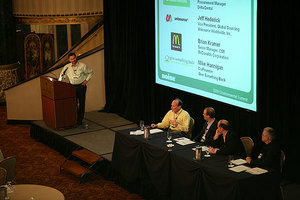-- Forest certification and sustainable forestry practices.
-- Carbon emission reduction and opportunities and challenges influencing
climate change.
-- Case studies on the environmental impact of paper and packaging
choices.
-- Real-world examples from representatives of Delta Dental, Unisource
Worldwide, McDonald's Corporation, and Give Something Back.
"This difficult economic time presents real opportunities for companies to
make business-savvy choices that positively impact the environment," said
Alexander Toeldte, Boise Inc. President and CEO. "We wanted to reiterate
our environmental commitment and illustrate ways Boise and our customers
can make real changes."
Toeldte explained that businesses can make a big impact -- on the
environment and on their bottom line -- simply by making seemingly minor
choices. Many of the summit's presenters and panelists echoed Toeldte's
recommendation.
Rachel Beckhardt of the Environmental Defense Fund said that a company's
paper choices represent some of the simplest ways that decision makers can
reduce their environmental impact. "Paper accounts for 30 percent of
landfill waste. Consider the impact that any business can have on the
environment simply by purchasing and using environmentally preferable
paper," she said. (Note to editors: See sidebar at the end of this release
for specific tips.)
In addition to the simple tips offered during Boise's 2009 Environmental
Summit, experts discussed potential climate change legislative outcomes and
opportunities. Tom Cushing of the CCX -- which introduced a voluntary,
legally binding integrated trading system to reduce emissions of all six
greenhouse gases -- predicted that the buying and selling of greenhouse gas
emissions will one day become the highest-traded commodity in the world.
"In 2008, CCX member companies traded 110 million carbon credits, as
compared to 2.2 million traded in 2004. That represents a lot of real money
in a market very similar to that on Wall Street," said Cushing.
Some companies, like summit sponsor Boise Inc., are already making
voluntary reductions to greenhouse gas emissions. The company has pledged
to reduce its greenhouse gas emissions 10 percent by 2014, by decreasing
total energy use, displacing fossil fuel with renewable biomass, and
pursuing energy cogeneration opportunities. In addition to emission
reduction, the company also relies on third-party certified sustainable
forestry to meet fiber needs for its paper production. Boise Inc. is also a
major manufacturer of recycled-content papers.
Whether large or small, Toeldte said putting Earth-friendly initiatives
into place comes down to one thing: Choice. "Company leaders need to be
aware of whether or not their actions are compromising environmental,
economic, and social values for the future. If they find they aren't acting
in an environmentally responsible way, then they have the choice to make
changes."
For more information about the 2009 Boise Environmental Summit, or to
receive photos and copies of each presentation, contact Laura Partynski at
630 227 3445 or LauraPartynski@BoiseInc.com.
Sidebar - Follow these choices from the Environmental Summit:
1. Choose lighter paper basis weights and cut sheet sizes; use two-sided
copying and keep mailing lists clean and accurate;
2. Of the paper you do use, increase the amount of recycled content vs.
virgin fiber used;
3. Of the virgin fiber you do use, choose from responsible manufacturers,
mills and paper suppliers by looking for sustainable forestry and
sourcing certification labels;
4. Choose to recycle paper when you are done using it;
5. Create environmental checklists; and
6. Reduce transportation emissions.
About Boise Inc.
Headquartered in Boise, Idaho, Boise Inc. (Contact Information: Boise Contact: Laura Partynski Office 630 227 3445 Cell 773 706 8555 Media Contact: Lauren Doyle Office 513 271 7333 x17 Cell 937 241 8378 Boise Inc. 591 Supreme Drive Bensenville, IL 60106 T 630 595 6440 F 800 563 1562
